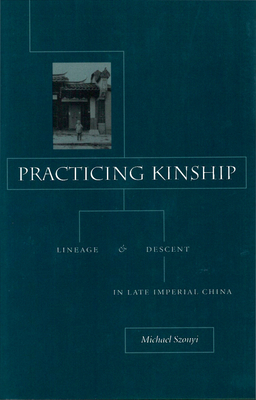

 Stanford University Press
Stanford University Press
Practicing Kinship: Lineage and Descent in Late Imperial China


Key Metrics
- Michael Szonyi
- Stanford University Press
- Hardcover
- 9780804742610
- 9.22 X 6.32 X 1.03 inches
- 1.29 pounds
- Reference > Genealogy & Heraldry
- English
 Secure Transaction
Secure TransactionBook Description
Presenting a new approach to the history of Chinese kinship, this book attempts to bridge the gap between anthropological and historical scholarship on the Chinese lineage by considering its development in terms of individual and collective strategies. Based on a wide range of newly available sources such as lineage genealogies and stone inscriptions, as well as oral history and extensive observation of contemporary ritual practice in the field, this work explores the historical development of kinship in villages of the Fuzhou region of southeastern Fujian province.
In the late imperial period (1368-1911), the people of Fuzhou compiled lengthy genealogies, constructed splendid ancestral halls, and performed elaborate collective rituals of ancestral sacrifice, testimony to the importance they attached to organized patrilineal kinship. In their writings on the lineage, members of late imperial elites presented such local behavior as the straightforward expression of universal and eternal principles. In this book, the author shows that kinship in the Fuzhou region was a form of strategic practice that was always flexible and negotiable. In using the concepts and institutions of kinship, individuals and groups redefined them to serve their own purposes, which included dealing with ethnic differentiation, competing for power and status, and formulating effective responses to state policies. Official efforts to promote a neo-Confucian agenda, to register land and population, and to control popular religion drove people to organize themselves on kinship principles and to institutionalize their kinship relationships. Local efforts to turn compliance with official policies, or at least claims of compliance, to local advantage meant that policymakers were continually frustrated.
Because kinship was constituted in a complex of representations, it was never stable or fixed, but fluid and multiple. In offering this new perspective on this history of Chinese lineage practices, the author also provides new insights into the nature of cultural integration and state control in traditional Chinese society.
Author Bio
Michael Szonyi is Professor of Chinese History and Director of the Fairbank Center for Chinese Studies at Harvard University. He is a social historian of late imperial and modern China. His research focuses on the local history of southeast China, from the Ming dynasty to the twenty-first century, using a combination of traditional textual sources and ethnographic-style fieldwork.
His books include The Art of Being Governed: Everyday Politics in Late Imperial China (Princeton, 2017); A Companion to Chinese History (Wiley, 2017); Practicing Kinship (Stanford, 2002) and Cold War Island: Quemoy on the Front Line (Cambridge, 2008; Chinese edition National Taiwan University Press 2016). He is also co-editor, with Jennifer Rudolph, of The China Questions: Critical Insights into a Rising Power (Harvard, 2017), a work celebrating the sixtieth anniversary of the Fairbank Center.
Szonyi received his Bachelor of Arts from the University of Toronto and his doctorate from Oxford University, where he was a Rhodes Scholar. He has also studied at National Taiwan University and Xiamen University. Professor Szonyi taught previously at McGill University and University of Toronto, where he received tenure in 2002. Szonyi came to Harvard in 2005, and was named John L. Loeb Associate Professor of the Humanities in 2007 and Professor of Chinese History in 2009.
He has a joint appointment in the Department of History. Szonyi has served previously as Director of Undergraduate Studies and Chair of the Committee on Regional Studies – East Asia (RSEA) AM program.
Source: Harvard University Department of East Asian Languages and Civilizations
Videos
No Videos
Community reviews
Write a ReviewNo Community reviews